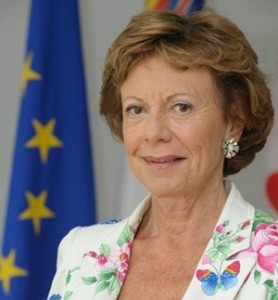Kroes: Copyright system failing
November 21, 2011
By Colin Mann
 Neelie Kroes, the EC’s Commissioner for the Digital Agenda, has renewed her criticism of Europe’s copyright regime, suggesting that the artist should be put at the centre of not only copyright law, but of the EU’s whole policy on culture and growth.
Neelie Kroes, the EC’s Commissioner for the Digital Agenda, has renewed her criticism of Europe’s copyright regime, suggesting that the artist should be put at the centre of not only copyright law, but of the EU’s whole policy on culture and growth.
Addressing the Forum d’Avignon event – which brings together players from the worlds of culture, the creative industries, the economy and the media – she noted that the creative sector was “a unique source for growth, both economic and social” as well as being essential to the EU’s image abroad, and its economic future. “And if we want it to stay this way, we must be able to support those who create art. We must be concerned about the fate of Europe’s struggling artists and creators. Art feeds the soul. But who feeds the artist?,” she asked.
Recognising that the debate focused on copyright, especially enforcing copyright, Kroes said that “legally, we want a well-understood and enforceable framework. Morally, we want dignity, recognition and a stimulating environment for creators. Economically, we want financial reward so that artists can benefit from their hard work and be incentivised to create more.”
She questioned whether the current copyright system was the right and only tool to achieve these objectives? “Not really, I’m afraid. We need to keep on fighting against piracy, but legal enforceability is becoming increasingly difficult; the millions of dollars invested trying to enforce copyright have not stemmed piracy. Meanwhile citizens increasingly hear the word copyright and hate what is behind it. Sadly, many see the current system as a tool to punish and withhold, not a tool to recognise and reward,” she declared. “Speaking of economic reward: if that is the aim of our current copyright system, we’re failing here too,” she added.
“We need to go back to basics and put the artist at the centre, not only of copyright law, but of our whole policy on culture and growth. In times of change, we need creativity, out-of-the-box thinking: creative art to overcome this difficult period and creative business models to monetise the art. And for this we need flexibility in the system, not the straitjacket of a single model. The platforms, channels and business models by which content is produced, distributed and used can be as varied and innovative as the content itself,” she said.
According to Kroes, information and communications technology (ICT) could help in this respect. “In all sorts of sectors, ICT can help artists connect with their audience, directly and cheaply. And it can help audiences find and enjoy material that suits their specific needs, interests and tastes. And ICT can help in other ways too, supporting a system of recognition and reward. A Global Repertoire database to find out what belongs to whom . Tracking technologies, to permit a totally transparent process for artists and intermediaries to find out who is looking at what artwork when and to distribute revenues accordingly. Digitisation, to make artworks available for instant transmission to distant fans.”
She suggested that cloud computing, which presented a totally new way of purchasing, delivering and consuming cultural works would certainly raise new questions about how licensing should function in an optimal way. “It’s not just about technology: smart legislation can help, too. We need to find the right rules, the right model to feed art, and feed artists. We need the legal framework to be flexible. This is my recipe, my commandment, my bumper-sticker to nurture creation. The digital world changes quickly, and if allowed to do so can permit creativity in all stages of the chain. So we shouldn’t prescribe a particular model, but set a framework allowing many new models to flourish,” she stated. This should be made as easy as possible to license, not obstruct that process while making sure that the system efficiently secured the interests of artists themselves. “This is what we are doing at the Commission with our future legislative proposal on collective rights management,” she advised.
Recognising the importance of release windows for the industry under current business models, she suggested that as new ways of watching films develop in the market, binding legislation dictating the sequence and period of release windows seemed inflexible, “and may make it harder, not easier, to provide and purchase content legally”. According to Kroes, a system of rewarding art, in all its dimensions, must be flexible and adaptable enough to cope with these new environments. Such a model should not be developed from the centre. “Rather we need to create a framework in which a model – or indeed several models – can develop organically, flexibly, in ways that support artists.”
“It’s not all about copyright. It is certainly important, but we need to stop obsessing about that. The life of an artist is tough: the crisis has made it tougher. Let’s get back to basics, and deliver a system of recognition and reward that puts artists and creators at its heart. Let’s not wait for a financial crisis in the creative sector to happen to finally adopt the right tools to tackle it,” she concluded.
